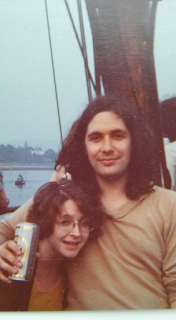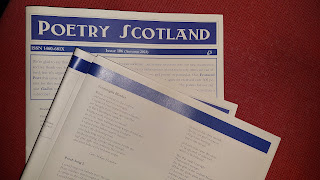So far this year, I've run a creative writing workshop in Hamilton Town House Library and played a small part in Eadar-Theanga / Between Tongues a zoom event celebrating Gaelic writing which was livestreamed on the FWS Facebook page. You can watch the recording via that link. I'm also running a mini-mentoring project in which I give feedback on a sample of individuals' writing.
Most recently, I took part in a livestreamed discussion featuring a conversation between Morag Anderson, who is this year's Makar, Marcas mac an Tuairneir and myself. You can watch the livestream via this link
The broadcast lasts just over an hour. To complement it, I thought I'd share the full answers I'd prepared in advance of the event. It's definitely worthwhile watching the livestream to see and hear the full discussion between all three of us. I learned so much from listening to Morag and Marcas's responses.
Anyway, here we go. It's quite a long post!
Carol's answers
What attracted you to writing poetry / short stories etc?
A. When
I was wee, we didn’t have many books in the house, but we did have weekly
comics and we got annuals for Christmas. Sometimes we visited the library, too.
I used to craft my own books, folding up paper and sewing them in the seam. I’d
draw, and create my own storylines, too, stimulated by whatever I was reading.
As for poetry… although I’m not religious, I did love singing in school. Our
regular songs were the old hymns from Victorian days, and the quality of
language and love in those hooked me. That’s when I became aware of the power
of thoughtfully placed vowel sounds and meter, e.g. ‘By cool Siloam’s shady
rill/how sweet the lily grows. How sweet the breath beneath the hill / of
Sharon’s dewy rose.’ (Reginald Heber, died 1826.) And what about ‘Oh little
town of Bethlehem, how still we see thee lie. Above thy deep and dreamless
sleep the silent stars go by…’ I mean,
I’m probably an atheist now, but how could anyone fail to be wowed by those
lyrics?
Also song lyrics from family party sing-songs.
See my blogpost https://carolmckay.blogspot.com/2013/06/it-was-third-of-june-memory-nostalgia.html
I got into writing poetry because of those
influences, at primary school. Lyrical prose writing came later, at secondary.
What are your favourite writers and poems / short stories / novels?
A. I
think he’s out of fashion now, but DH Lawrence was the prime influence for me.
His Sons and Lovers was the first time I’d read and recognised myself in
a novel. The main character was a boy and I was a girl, but that didn’t matter.
He had a bond with his mother like an invisible umbilical cord, and so had I.
He had a dad who was dangerous through drink, and so did I. And just so many
other things about Lawrence. I loved his language, though I find it overly
flowery now.
Favourite novels now include Jon McGregor. Anne
Tyler. Claire Keegan. Graeme Macrae Burnet.
Favourite poets are Don Paterson. Jim Carruth.
Magi Gibson. Chris Powici. Finola Scott. So many! We live in privileged times.
Short story writers? Anne Donovan. Dilys Rose.
Kevin Barry. Raymond Carver. James Kelman, of course, for making me realise
that one dialect of English is a valid as any other and that to have – for
example – urban Scots contained within speech marks while the narrator speaks
‘proper English’ is wrong, wrong, wrong. One person’s mother tongue is as valid
as any other person’s mother tongue.
Which of your own poems (or short stories) are you most happy to have
written, and why?
A. I
was overjoyed to have a short story make it into New Writing Scotland recently.
It was a story that had been rejected 16 times but I believed in it and kept
going, trimming it and reworking bits of it. It’s ‘Her Body Was An Aviary’, and
it was in Break in Case of Silence: NWS 39.
I was also very pleased to have a story of mine
feature as the opening story in the first issue of Gutter magazine. ‘Frozen
Waste’ it’s called. I love and admire Gutter. I was pleased they opened their
special 20th issue with one of my stories, too.
As for poetry – hmm – my usual themes in all my
writing are about social misfits and alienation and addiction and so on, so
probably ‘Holding all the ACEs’ is the one whose publication moves me most. It
was in Gutter, too.
I should mention that one of the things that
quietly satisfies me most as a writer is actually something I self-published.
Correction, my husband published it through his PotHole Press imprint. It was an
ebook of personal accounts of what it feels like to live with the rare health
condition Addison’s Disease. It was too niche for the general publishing world
because only about three people in 10,000 have Addison’s Disease, but we saw
the possibilities offered by ebook publishing, gathered 16 accounts from people
around the English-speaking world through an appeal on social media, and
brought them together in Second Chances: true stories of living with
Addison’s Disease. It’s a life-threatening condition. I felt very alone
when I was diagnosed in 2010 and I wanted to produce a book that people could
turn to so they would be reassured they could live a good life even with the
condition. My husband Keith made a great job of producing it.
Favourite ways to write? (e.g. special routines, places, comfort zones)
A. Walking
is good preparation! That and washing dishes. Mindless tasks with rhythm that
enable the mind to wander free. I love being out in the natural world and often
talk into my voice recorder on my phone to help me remember things as otherwise
they’ve gone by the time I get home. I tend to be a daytime person, too, and
I’m definitely more comfortable when there’s no one behind me and when there’s
music playing quietly in the background.
 |
| Walking in nature boosts creativity |
How many times do you edit a poem?
A. As
many times as I feel it needs! Some come more fully formed than others. I
definitely recommend leaving a draft aside for a while before coming back to
edit it. Editing is best when we can see a piece with fresh eyes. Reading out
loud also helps us judge how it’s working.
How do you know when a piece of your writing is 'finished'?
A. Is
it ever finished? I had a short story in Glasgow dialect published this year in
Five Glasgow Stories by Postbox Press, the literary fiction imprint of
Red Squirrel Press. I edited that story so many times. Finally felt happy with
it. Checked two stages of proofs before I finally okayed it. Got the book in my
hand and realised I’d still managed to miss some things. Using ‘I’ instead of
‘Ah’. Wee things like that are always easy to miss and you just have to forgive
yourself!
What advice would you give yourself starting out now?
A. Network
more. Don’t be shy. Get out there. But also read. Read what’s current. Go to
events in your area. Don’t be the writer in the garret.
What magazines and websites do you recommend to writers?
A. Well…
Gutter! But also Extra Teeth, Southlight, Causeway, Poetry Scotland, Northwords
Now, Soor Ploom Press. From Glasgow to Saturn. But also look beyond Scotland’s
borders to Magma and Rialto, Honest Ulsterman and Stinging Fly and so on. Sign
up to Creative Scotland and Scottish Book Trust’s mailing list to keep up to
date with opportunities. The Federation of Writers itself has an amazing
resource available to us through its monthly mail-out. St Mungo’s Mirrorball,
too.
What makes a 'good' poem?
A. One
with vitality and freshness in language. But contemporary language. Not
grandiose Victoriana. Imagery – putting
pictures in your head. And contemporary subject matter. It’s about experiencing
the world we live in now. The human condition.
Is there a hierarchy in literature?
A. Yes,
there’s a hierarchy in everything, isn’t there. It’s just the way it is. Lots
of wee burns flow into a river, and that flows into the sea. Each is a thriving
community and each is important.
Are the gatekeepers of the publishing industry open minded, or does
subjectivity - personal taste - play a part?
A. I
think we’re all creatures of our times and subjectivity is definitely a part of
the selection process, be it for novels or for stories or poems. Fashions are
just part of how it is. Publishers might want originality, but then reject it
because it’s unfamiliar and they think it won’t sell. And they are running a
commercial business, after all. But then someone else accepts that novel and
it’s a hit and suddenly everyone wants more like that – it’s set a new fashion.
I’m thinking here of someone like Graeme Armstrong, whose novel The Young
Team took a long time to find someone to believe in it. (300 rejections?)
And he’s now one of Granta’s young writers to look out for.
Should you 'write what you know'?
A. Yes,
but no, but yes, but…
What excites you about the future for poetry and other writing?
A. In
Scotland, at this time, we are seeing a lot of ‘New Scots’ in our schools. Far
greater diversity than when I was growing up. I think that’ll work wonders for
our creative sector. I’m really looking forward to that. They better get a move
on, though, or I’ll not be around to see it!
What does the Federation mean to
you, and – by extension – in what ways can the Federation help writers?













